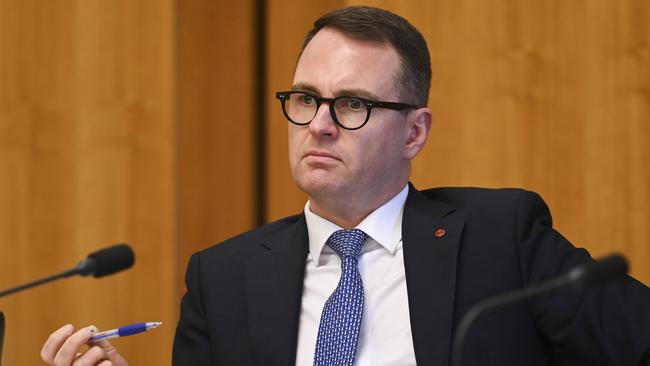Australia ‘at risk of being left behind’ after US SEC approves 11 bitcoin ETFs
Crypto players expect a strong take-up of bitcoin products after US regulators approved 11 ETFs pegged to the digital currency but say that without regulatory action, Australia could lag behind.
Market participants are preparing for local cryptocurrency trading infrastructure to rapidly mature in the wake of the US regulator’s “watershed” approval of 11 exchange-traded fund products.
But Australian players have warned local regulation needs to catch up quickly to avoid investors fleeing offshore to better serviced regimes.
The US Securities and Investments Commission’s decision on Thursday (AEDT) to approve 11 bitcoin ETFs is expected to deliver significant inflows and spark a medium-term rally in bitcoin, with local product vendors arguing the approval gives legitimacy to crypto as an asset class, alongside the likes of shares and cash.
Australia’s market operator ASX could give the green light for local investors to buy and sell the first cryptocurrency ETFs in coming months.
But industry argues that Australia is at risk of being left behind without a realistic framework for crypto ETFs and regulation of digital currencies as a whole.
NSW Liberal senator Andrew Bragg said that the lack of regulation of digital currencies and local custodians in Australia would force more investors and local players offshore without urgent action.
“The reality is people have wanted diversity of ETFs for some time and the fact that the US is moving ahead of Australia should give us pause to reflect on what it means for us. There is a bill in the Senate that could be progressed and would solve a lot of issues here,” he said.
“If you are running a crypto market or brokerage firm you will migrate to places where there are clear laws about what you can do and provide certainty.
“The worst thing we can do is to put our head in the sand.”

The ASX in 2022 amended its AQUA rules, which deal with the admission of ETFs, to establish a new category of permissible underlying assets.
But critics argue that the approach has been cautious, with brokers required to fund special margins of 40 per cent to cover daily fluctuations, which has made the economics of such products unattractive.
VanEck chief executive Arian Neiron, whose company has applied to offer crypto ETFs on the ASX, said the clearing requirements were quite onerous for market participants such as brokers, making the economics a hurdle for entrants.
“Furthermore, there are next to no digital asset custodians in Australia that abide by the custodian requirements, which again contribute to the difficulty surrounding a direct exposure to spot price of bitcoin in this market on the ASX,” Mr Neiron said.
“That said, VanEck is objectively better positioned and more resourced than anyone else in Australia to launch a spot bitcoin ETF on the ASX.”

Brisbane-based Monochrome Asset Management and VanEck have applications before ASX that are being considered. “ASX continues to engage with a number of issuers that are interested in admitting crypto-asset based ETFs,” an ASX spokesman said.
Australia’s alternative market, run by Cboe, has a single ETF with exposure to bitcoin, the Global X 21Shares Bitcoin ETF with $40m under management, after a number of other players exited the market on low volumes.
The Australian Securities & Investments Commission on Thursday said market operators that quoted ETFs (currently ASX and CBOE) had to decide whether products met their operating rules and procedures, but warned that the asset class was very risky for investors.
“ASIC has repeatedly warned investors that crypto is risky, inherently volatile and complex. Investing in it is a highly speculative activity. Investors should only put in what they are prepared to lose,” an ASIC spokesman said.
Many mainstream investors remain sceptical of the asset class.
TCorp chief investment officer Stewart Brentnall said that cryptocurrency was a fairly speculative investment and that NSW’s fund management arm did not consider it to offer investment opportunities in the near-term.
“It’s very easy to determine what the price is, very hard to determine what the value is. And that’s a very important comparison, in investment and portfolio construction. It is a very young and early market that still is not institutionally regulated or custodied,” Mr Brentnall said.
“And you put those two together and it’s not something which we would consider as an asset class.”
But players with skin in the game are optimistic in the wake of the US move.

“We anticipate heightened demand for this type of exposure from investors, particularly here in Australia, Global X ETFs Australia chief executive Evan Metcalf said.
“The SEC’s approval affirms the maturation of the cryptocurrency space, strengthening its position as a legitimate and promising avenue for investors.”
Betashares digital assets head Justin Arzadon said flows into US-traded spot bitcoin ETFs in the initial days after launch were expected to be significant and “would serve as an endorsement of the global investor preference for ETFs over other investing structures”.
One of Australia’s largest digital asset exchanges, BTC Market, sees the acceptance would provider greater context for ASX to approve spot bitcoin ETFs and was likely to see crypto markets expand.
“The impacts will be increasingly felt over time. 2024 may be the year of bitcoin dominance, with the next halving expected in April. This reduction in supply will take place in an increasingly risk-on investment market. These conditions have historically predicated a bull run in cryptocurrency trading,” BTC Markets CEO Caroline Bowler said.
Bitcoin was at $US46,058 at the local close on Thursday, up 156 per cent for the past year.








To join the conversation, please log in. Don't have an account? Register
Join the conversation, you are commenting as Logout